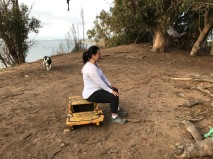It’s Sunday. So Monday is closing in on us.
When I first heard a public defender use the term Sunday Scaries, I didn’t need any further explanation. That feeling of bracing yourself for the next work week. That feeling of prep and motions I’d hoped to have finished already, but have not. That feeling of wishing I had better news to give clients about negotiations or investigations. The mountain of recordings that just came in and need reviewed.
When I have discussions with public defenders about what the Sunday Scaries actually feel like, we describe anxiety, sleeplessness, sadness, second guessing, emotional exhaustion, dreading work.
This work is just so very intrusive sometimes. It’s there all the time, imprinted on our minds and bodies, reminders around every turn.
There’s a certain intersection I avoid, because driving through it, and past the flower memorial that has been continually refreshed there for a decade, causes my mind to revisit photos of a crash scene and child’s autopsy.
Every public defender I know has similar stories, but many of us fail to view these experiences through the lens of continually experiencing trauma at work.
Many of us learn about the impacts of trauma in an analytical way, through the preparation of our cases. We learn the importance of working with experts in PTSD or Adverse Childhood Experiences to understand and present the stories of the people we represent. We fail to turn this same insightful lens on ourselves, sometimes voicing the view that to do so would be unacceptably vulnerable, or even disloyal by taking our focus away from the traumatic experiences in the lives of the people we represent. Trauma impacts us, too, in ways we need to acknowledge and process if we are going to stay in this work.
There’s a case I think of often, and each time there is a dull ache in my hands and forearms. During the trial, as I questioned a child, I gripped the table behind me so tightly that eventually a weird, numb weight took over my hands and forearms. I loosened my grip and felt pins and needles in my hands. Jurors cried as the questions continued, about the night this child’s mother died on the other side of her bedroom wall. After a while, I felt the heavy, numb forearms again and realized that I was white knuckling the edge of the table again. The case had a good outcome, but every time I think of it my hands and forearms still ache.
Bessel van der Kolk, M.D, author of the beautiful book, The Body Keeps the Score: Brain, Mind, and Body in the Healing of Trauma, explains that trauma results in a fundamental reorganization of the way the mind and body manage perceptions. Trauma is not just an event that took place sometime in the past; it is also the imprint left by that experience on mind, brain, and body. Apparently it even gets stuck in our forearms sometimes.
In addition to primary or direct experiences of traumatic events, we in public defense also experience secondary traumatic stress, which is the emotional duress that results when an individual hears about the firsthand trauma experiences of another person. This definition is from Figley’s Compassion Fatigue: Secondary Traumatic Stress Disorders from Treating the Traumatized. Everyone who works with and/or assists traumatized or distressed children, adults or families is at risk for secondary traumatic stress—including therapists, nurses, teachers, hospice workers, social workers, journalists, firefighters, physicians. STS is sometimes also called Compassion Fatigue, and we know from Linda Albert’s study of Wisconsin Public Defenders that public defenders are impacted (as described in this prior post).
A colleague had a case that we discussed constantly as he prepared for trial. At one point I listened to the recording of the wailing cries of the mother whose child had just drowned in the bathtub. Those sounds went into my mind and stayed there, where they still replay sometimes.
There are constant opportunities to experience primary and secondary trauma in public defense work, including: seeing a person you represent being taken into custody; seeing a person you represent being sentenced; seeing the pain and struggle of the family and community of the person you represent; watching your colleagues struggle and face abusive treatment by judges, prosecutors and others; viewing injury, autopsy and scene photos; scene visits; reviewing records of trauma; hearing stories of trauma; hearing testimony of violent events; dealing with prejudice and abuse within the criminal sentencing bureaucracy; seeing the reality of the jail conditions experienced by the people we represent.
The symptoms of secondary traumatic stress have a striking similarity to the Sunday Scaries: anxiety, hypervigilance, intrusive thoughts, chronic fatigue, sleeplessness, sadness, anger/irritability/impatience, poor concentration, second guessing, detachment, emotional exhaustion, fearfulness, shame, physical illness, lateness, absenteeism, difficulty sleeping, nightmares, stomachaches, headaches, strained relationships, disconnection from purpose, dreading work. Many of us experience some combination of these symptoms so frequently that we incorporate them into what we expect working in public defense to feel like.

Bessel Van der Kolk talks about recovery from trauma through mind-body connection and body focused practices like yoga and meditation. He emphasizes that human memory is a sensory experience, and movement practices can restore a sense of goodness and safety. In my own experience, yoga and meditation practices are particularly well suited for processing our constant intake of public defense trauma, and can help cultivate resilience in the face of feeling overwhelmed by these traumatic impacts. Dr. Van der Kolk also explores the benefits of writing and journaling.
Do you practice yoga or meditation? Do you write or keep a journal? Let us know in the comments how these practices help you sustain your public defense work, or other practices or approaches that you find helpful in response to the challenges of secondary traumatic stress.
The only thing that consistently works for me is running or talking it out with a fellow public defender.
LikeLiked by 1 person